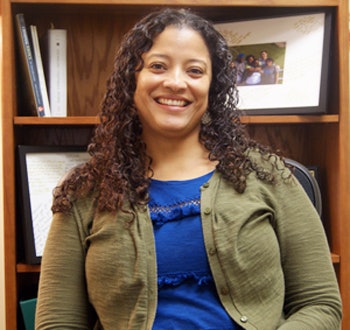After receiving her master’s degree in justice, law and society from American University, Vanessa Correa didn’t think she’d end up having a career in higher education.
“I spent some time doing research on crime and looking at crime and different programs that were created to address crime and [doing] lots of research, but I really missed that personal touch of working one-on-one with other people,” Correa says.
 Vanessa Correa
Vanessa CorreaThe help she received from people who pushed her to be the greatest she could be played a huge role in her decision to work as a counselor for students transitioning from high school to college, including first-generation college students.
Today she thrives on guiding and assisting students transitioning into higher education in her role as the associate director for first-generation initiatives in the Office of Diversity, Inclusion, and Multicultural Education (ODIME) at George Mason University (GMU). Correa began working at GMU in April 2017 and is enjoying meeting students and faculty and gaining training skills to help meet students’ needs.
“I really do look forward to what’s to come, and I’m very much looking forward to continuing to work with the students,” she says.
She is also the program director for the Student Transition Empowerment Program (STEP), a GMU summer program that focuses on first-generation students transitioning into college.
“Mason had been on my radar for a while because of the good work that’s being done here. I started to look a little bit more into Mason’s students and the support it has provided to students here,” Correa says. “So finding out that Mason students graduate at the same rate regardless of race or ethnicity, so graduation rates are the same for Black students, Latino students, Asian students as their White counterparts really made me think, ‘Wow, Mason’s doing something right,’ and the opportunity to not just come to Mason but then to work with the first gen population, for me it felt like a natural combination.”
Correa’s ultimate goal is to make sure GMU students have a positive college experience. She also wants to help them face any hardships they may experience during the sometimes difficult transition to college.
The work has particular meaning for Correa because she and her two older sisters, Maritza and Wanda, were first-generation college students. Growing up in a Puerto Rican household, Correa lived in public housing in Manhattan, where she had both good and bad experiences.
Because of that, Correa’s parents often sent her to Puerto Rico in the summer, so she could be with her family and spend time at the beach.
Correa says her role models are her parents because of the sacrifices they made coming to New York and for emphasizing the power of education. “As I’ve gotten older, [I’m] really thinking more about that and how much of that has had an impact on me, on what I do every day,” she says.
After receiving her bachelor’s degree in sociology from Cornell University, Correa was a counselor for the Higher Educational Opportunity Program (HEOP), which helps underrepresented students coming to Cornell, giving them additional services and support they need.
Correa then worked as director of the Community Scholars Program at Georgetown University, which is geared toward providing support to first-generation students, similar to her new position at GMU.
“It turns out that one of the people from Cornell that I had kept in contact with that whole time recommended me for that position at Georgetown,” she recalls. That individual forwarded Correa’s name to the hiring manager and mentioned that she may be good for the position. “That was 10 years ago, and I don’t regret making the change at all.”
She especially enjoys the informal conversations with students in her office and on campus, whether they’re just saying hello or having an in-depth conversation.
“For me that reinforces what I do and why I do the work that I’m doing, in addition to just feeling like I want to give back because so many people helped me along the way,” she says.
Correa also enjoys helping students figure out what they need to do in order to be successful.
She never gets tired of seeing them walk across the stage at graduation. Correa says the greatest thing about her job is seeing students who come in to STEP unsure and not confident, but who leave feeling like they can take on the world.
“They know the school, they know their resources, and they have a better sense of who they are and who they will be as students,” Correa says. “Watching that transition from the beginning of the summer to the end of the summer is really something neat to see.”
- This story also appears in the July 12, 2017 print edition of Diverse.


















